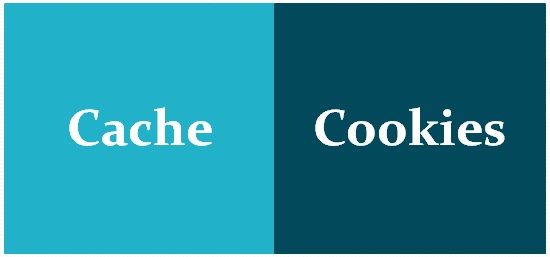 Cache and cookies were invented to boost up website performance and to make it more accessible through storing some information on the client machine but, they perform different operations. Cache is used for storing the web page resources in a browser (client-side) in order to decrease the loading time whereas cookies are employed for storing browsing session to track the user preferences.
Cache and cookies were invented to boost up website performance and to make it more accessible through storing some information on the client machine but, they perform different operations. Cache is used for storing the web page resources in a browser (client-side) in order to decrease the loading time whereas cookies are employed for storing browsing session to track the user preferences.
Let us understand the difference between cache and cookies with the help of comparison chart shown below.
Content: Cache Vs Cookies
Comparison Chart
| Basis for comparison | Cache | Cookies |
|---|---|---|
| Basic | Cache is used for storing the website content for the future purpose. | A cookie is used for storing user preferences. |
| Stores | HTML pages, relating images, Javascript and CSS. | Browsing sessions, temporary tracking data. |
| Capacity | Uses a large amount of space. | Less space is consumed. |
| Expiration | Manual | Automatically expired |
| Storage location | Browser | Browser and server |
| Types | Browser cache and proxy cache. | Transient and persistent cookies. |
| Sent with requests | No | Yes |
Definition of Cache
Cache is a memory area on hard disk where browser stores the web objects or internet files on the user’s machine. Whenever a user visits a website, at first the browser inspect objects in its cache before requesting it from the website. Caching enhances the speed of web surfing improves the accessibility.
For example, I frequently use techdifferences.com, if its objects such as logos and navigation bars are stored in my browser’s cache, then the browser need not get them from the particular website and browser can easily use the cache objects which save time.
Caching certainly reduces the load, bandwidth requirement and increases the speed of the delivery of the web resources to the end user. The least frequently used web objects become stale if a web object is stale then those are considered to be not in cache. Each web object has an expiration time associated with it. The expiration time is defined in the HTTP header of the web object.
Definition of Cookies
Cookie is a simple piece of information stored on the client computer. Whenever a user surfs the internet, the server-side code sent a small text file, i.e., cookie in the response header from an HTTP server and stored on the user’s computer. Its reason is that when the next time user visits the same site again, the cookie facilitates server to identify the client based on cookie information.
This overcomes the limitation of the HTTP protocol which is stateless. This signifies that every request from a client is served as new request even to the same server and same session.
Cookies are not intended to cause any damage to the user’s computer as they do not contain executable code. Although, cookies can be utilized to send the targeted advertisements to the users unknowingly.
Types of cookies
Transient cookie: This type of cookie live for the lifetime of the session.
Persistent cookie: This cookie remains on the user’s computer beyond the lifetime of the session.
Key Differences Between Cache and Cookies
- Whenever you visit a website, your web browser gathers the content or information regarding to that particular website such as HTML pages, relating images, is known as web caching and the memory where it is stored is known as cache. On the other hand, Cookie is a piece of information sent from the server side to the client side in order to remember the user preferences and session details.
- The cache could consume large space as it stores various web contents. In contrast, a cookie consumes less space because it stores text files (usual size 4 Kb more or less).
- The information stored on cache have to be removed manually, but cookies are self-expirable and are automatically removed.
- Caching involves client-side browsers only, whereas, cookies are stored on both the side, client and server.
- Basically, a cache can have two variants, browser and proxy cache. On the contrary, cookies are of two types transient and
persistent. - A cookie is sent as HTTP response to the client from the server. As against, caching doesn’t use HTTP requests in the process of storing the information.
Conclusion
Cache and cookie improve internet surfing experience through storing pieces of information such as cache stores website contents and cookie stores browsing session (user preferences) which significantly reduces the loading time of a website.
The cache can never cause any harm to the user’s computer, but a cookie can compromise users privacy, attackers use modern methods to misuse cookies for collecting personal data.
Bruce Crawford says
Is it advisable to periodically delete cache and cookies?